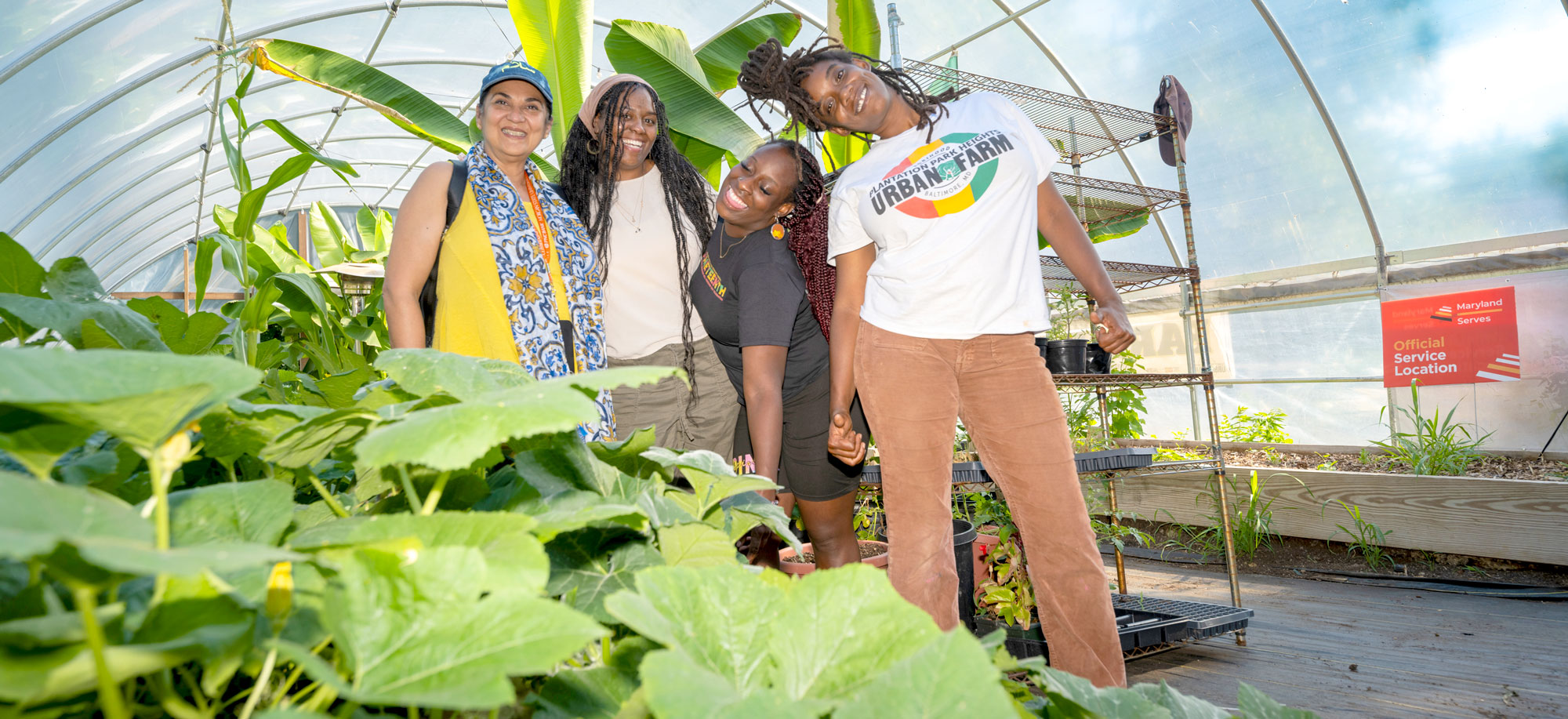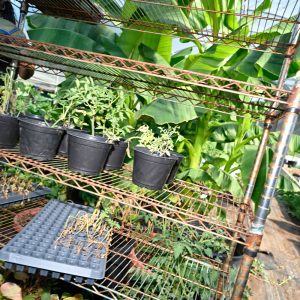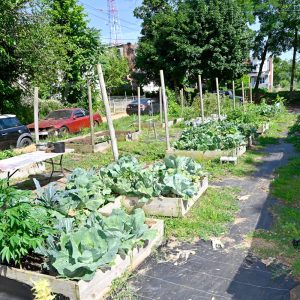By: James Michael Brodie
About five miles northwest of downtown Baltimore, in the 1,500-acre Park Heights community, stands the Plantation Park Heights Urban Farm. Begun in 2014 by Richard Francis, b.k.a. Farmer Chippy, as a box garden to grow fresh herbs and vegetables in his neighborhood, the project has evolved to become a full-fledged business with a social mission: to offer wholesome food and create healthy, sustainable communities in Baltimore and beyond.
Strong community partnerships have aided Plantation Park Heights’ work toward those goals, and one of the strongest of its alliances is with Morgan State University.
Samia Rab Kirchner, Ph.D., associate professor of Urban Design and interim chair of the Undergraduate Design Department at Morgan, has become a mainstay at the farm. Dr. Kirchner was educated in architecture and design at the National College of Arts, in Pakistan; Massachusetts Institute of Technology; Georgia Institute of Technology; and elsewhere, and has applied her knowledge of design, and her passion, to wide-ranging problems, including environmental problems, during her 30-year professional career.
“There was a need, and I was blessed to have the skills to (fulfill) those needs. It’s been quite a journey,” Dr. Kirchner says about her work with Plantation Park Heights. “When I was doing research on the Chesapeake Bay, I knew that in order to keep it clean, we had to look further upstream, look at the entire city. It turned out that Park Heights is the highest plateau in the city.”
Aware of the many downstream environmental benefits of urban farming, Dr. Kirchner has had the students of her Urban Design studios engage with the Park Heights community since 2018. One of her studio partners, Joi Dabney of Towanda-Grantley — one of the 12 smaller neighborhoods that make up Park Heights — introduced her to Francis of Plantation Park Heights in 2020. A steady collaboration has continued since then. Working with the urban farm’s site manager and youth manager, Keith Owens, and other volunteers, a partnership emerged last spring funded, by a Mellon Foundation Humanities in Place Grant: 10 young farmers from the community worked with 10 Morgan students from the University’s Design and Human Behavior course to publish a book about Plantation Park Heights, titled “Agrihood Baltimore.”
“Morgan reached out to us, we sat down, and we combined our strengths,” recalls Owens. “We saw how their talents helped some of our young men. It’s a blessing. I have lived here (in Baltimore City) all of my life, and this is the most impactful thing I have ever done.”

Academics and Activism
Cincinnati native Khalia Young was one of the Morgan students who found a growth experience at Plantation Park Heights. Now a 2021 graduate of Morgan with a master’s degree in City and Regional Planning, she had never spent any significant time on a farm before moving to Baltimore. But after meeting Kirschner and studying the farm, she soon became a fixture there. Continuing to work at Plantation Park Heights about twice a month since graduation, Young has evolved from working the soil to helping Farmer Chippy and his staff organize events and community outreach.
 “It has been eye-opening because of relationships that have grown over time,” Young says. “The conversations are holistic, from people coming from all walks of life…. What you learned is that no one knows everything. It is insightful.”
“It has been eye-opening because of relationships that have grown over time,” Young says. “The conversations are holistic, from people coming from all walks of life…. What you learned is that no one knows everything. It is insightful.”
Harold Morales, Ph.D., associate professor and director of the Center for the Study of Religion and the City in Morgan’s Department of Philosophy and Religious Studies, is another strong Morgan connection to the farm. Dr. Morales says he found a second home in Baltimore when he arrived from California in 2013 and encountered a number of people doing social justice work. It felt right.
“As soon as I landed in Baltimore, I looked for the activists and community organizers,” Morales says. “All of these folks were responsible for uplifting the community.”
Plantation Park Heights presented an opportunity for him to blend academics with activism to serve the community. When the COVID pandemic struck, the Henry Luce Foundation allowed Morales to use a grant originally slated for research of mural art to also provide much-needed direct aid to community organizations in Baltimore City. The Foundation also increased the grant amount from $50,000 to $150,000.
Seeking worthy beneficiaries for the grant funds, Morales teamed with Kirchner, who asked for help in establishing a demonstration kitchen for Farmer Chippy’s urban farm. Soon after that project began, the religion and philosophy professor found himself working at the farm: planting, weeding, cultivating and growing emotionally and spiritually.
Dr. Morales expresses hope that more of Morgan’s resources can be directed to causes such as Plantation Park Heights Urban Farm, entities underserved by the federal and state governments and by universities.
“The question around higher education and its relevance in the future is about how we are going to prepare students,” he says. “How do we dismantle unjust systems and build and imagine new institutions? We want to broaden our humanity.”
Acknowledging Abundance
 For Kirchner, who is a native of Pakistan, the meals Francis prepares at the farm have been catalysts for that broadening.
For Kirchner, who is a native of Pakistan, the meals Francis prepares at the farm have been catalysts for that broadening.
“Chippy is from Trinidad, and they have a large South Asian population,” she explains. “So, when he cooks, he is cooking with my spices. The smells and the food just take me straight back home.”
In the herb garden at Plantation Park Heights, there is sage, basil, thyme, dill, garlic, coriander. The urban farmers are also expanding the farm’s offerings with such food items as eggplant, watermelon, tomatoes, okra and various peppers. They are in the process of planting apple and cherry trees and strawberry bushes. Now under construction are a community kitchen and a community store.
“What the farm is teaching me is that there is so much abundance, and it is our perception that we have scarcity,” says Kirchner, who is featured with Young, Morales and 14 others in “Agrihood Baltimore,” which was published last year. “If you use your own seed, then that seed that is coming out of the ground has a relationship with the soil, and it grows better. This concept of localization is a totally different way of decolonizing.”
Morgan reached out to us, we sat down, and we combined our strengths. We saw how their talents helped some of our young men. It’s a blessing.
– Keith Owens
Site Supervisor and Youth Manager, Plantation Park Heights Urban Farm
The conversations are holistic, from people coming from all walks of life…. What you learned is that no one knows everything.
– Khalia Young, ’21
Morgan City and Regional Planning Graduate and Plantation Park Heights Urban Farm Volunteer





